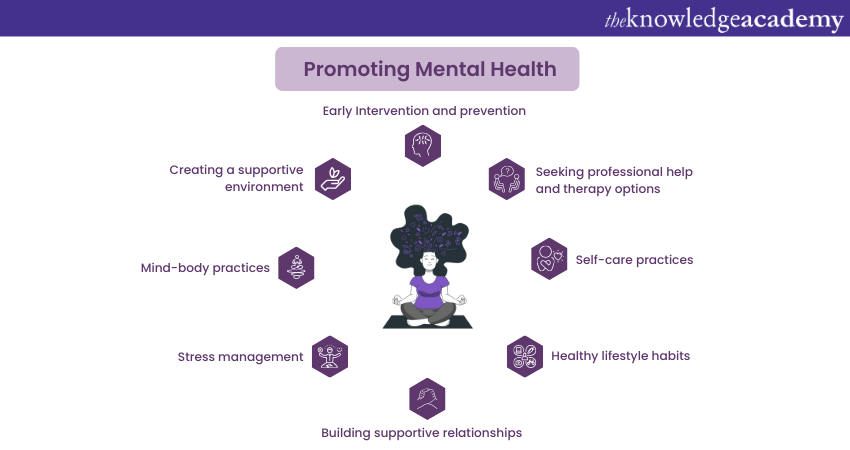We may not have the course you’re looking for. If you enquire or give us a call on 01344203999 and speak to our training experts, we may still be able to help with your training requirements.
Training Outcomes Within Your Budget!
We ensure quality, budget-alignment, and timely delivery by our expert instructors.

Mental Health is a person's emotional, psychological, and social well-being. It affects how individuals think, feel, and act and is vital to their overall well-being and quality of life. Recognising Why Mental Health is Important, is crucial for individuals and society as a whole.
Understanding the factors that determine mental well-being allows us to gain insights into the complexities of Mental Health and its impact on our lives. Read this blog to learn Why is Mental Health Important for a happy and balanced life. Additionally, you will learn about the value of mental and emotional health and how it affects your well-being. You will also discover methods for maintaining and enhancing your mental well-being as well as how placing a priority on your mental health may result in a better, more satisfying life.
Table of Contents
1) Understanding the importance of Mental Health
2) Factors influencing Mental Health
3) Consequences of neglecting Mental Health
4) Promoting Mental Health
5) Why should we promote Mental Health awareness?
6) Good Mental Health benefits
7) Conclusion
Understanding the Importance of Mental Health
Mental Health encompasses a person's emotional, psychological, and social aspects. It is not simply the absence of mental disorders but includes positive mental well-being as well.
There is a strong connection between Mental Health and physical health. Both significantly influence each other, contributing to holistic well-being. Poor mental well-being can adversely affect physical health, leading to a compromised immune system, increased risk of chronic illnesses like cardiovascular diseases, and slower recovery from injuries or illnesses.
Moreover, mental well-being is vital for daily functioning and quality of life. When Mental Health is optimal, individuals experience improved cognitive abilities, emotional stability, and better decision-making skills. They can effectively manage stress, maintain healthy relationships, and achieve a sense of fulfilment in various aspects of life.
Conversely, untreated Mental Health issues can significantly impair daily functioning. Individuals may struggle with concentration and focus, have trouble managing emotions, and face challenges maintaining stable relationships. Mental Health problems can also affect productivity, job performance, and overall satisfaction with life.
Recognising that Mental Health is not a static state but a continuum is essential. It fluctuates throughout one's life, influenced by various factors such as genetics, life experiences, and environmental circumstances. Thus, understanding the dynamic nature of Mental Health allows individuals to prioritise self-care and seek appropriate support when needed.
Factors influencing Mental Health
Understanding the diverse factors that influence Mental Health is crucial for promoting well-being. Considering the significant range of factors, it is all the more vital to address them thoroughly.Now let's explore these key factors in detail:
Biological factors
Biological factors play a significant role in shaping an individual's mental well-being. Genetic predisposition and hereditary factors can contribute to certain Mental Health conditions. Some individuals may be more susceptible to disorders such as depression, anxiety, or bipolar disorder due to their genetics.
Chemical imbalances in a person's brain, such as low serotonin or dopamine levels, can also affect mood regulation and overall mental well-being. Additionally, neurological disorders like Alzheimer's disease, epilepsy, or multiple sclerosis can profoundly impact Mental Health, leading to cognitive impairments, emotional instability, or mood disorders.
Environmental factors
Environmental factors have a considerable influence on Mental Health outcomes. Childhood experiences and trauma, such as abuse, neglect, or losing a loved one, can have long-lasting effects on mental well-being. Negative experiences during childhood can increase the chances of developing Mental Health issues in adulthood.
Socioeconomic status and access to resources also play a role. Individuals facing poverty, social inequality, or limited access to healthcare and education may experience higher stress levels, impacting their Mental Health. Moreover, social support systems and relationships are crucial. A strong support network, positive relationships, and a sense of belonging can promote mental well-being and resilience.
Lifestyle factors
Lifestyle factors significantly influence Mental Health. Effective Stress Management and coping mechanisms are essential for maintaining mental well-being. Individuals with healthy coping strategies, such as practising mindfulness, engaging in hobbies, or seeking therapy, are better equipped to manage stress and navigate challenges.
Maintaining a balanced lifestyle that includes regular exercise, a nutritious diet, and adequate sleep can positively impact Mental Health. Exercise releases endorphins, the body's natural mood enhancers, while a healthy diet provides essential nutrients for brain function. Sufficient sleep is crucial for emotional regulation and cognitive processes.
On the other hand, substance abuse, including alcohol or drug misuse, can have severe repercussions on Mental Health. Substance abuse often increases the risk of developing mental disorders, exacerbates existing conditions, and hampers overall well-being.
Learn to encourage mental wellbeing with our Mental Health and Wellbeing Training!
Consequences of neglecting Mental Health
Neglecting mental well-being can have profound consequences beyond the individual's well-being. Here are three key areas where neglected Mental Health can have a significant impact:
Increased risk of developing mental disorders
Ignoring Mental Health concerns and failing to seek appropriate support can heighten the risk of developing mental disorders. Untreated anxiety, depression, or other conditions may worsen over time, leading to chronic and debilitating symptoms. Without intervention, these disorders can impair daily functioning, limit productivity, and hinder overall quality of life.
Impact on physical health and chronic illnesses
Neglected Mental Health can take a toll on physical well-being. The mind and body are interconnected; poor mental well-being can contribute to various physical health problems. Chronic stress, often associated with untreated mental and emotional health conditions, can weaken the immune system, leaving individuals more susceptible to illnesses.
Mental Health issues may increase the risk of developing chronic conditions like cardiovascular diseases, diabetes, and autoimmune disorders. Compromised mental well-being can hinder the ability to adopt and maintain healthy lifestyle habits, further exacerbating physical health concerns.
Effects on personal relationships and social functioning
Mental Health concerns can significantly impact personal relationships and social functioning. Untreated Mental Health issues may lead to difficulty establishing and maintaining healthy relationships. Symptoms such as irritability, social withdrawal, or mood swings can strain interactions with loved ones.
Neglected Mental Health can also hinder social functioning, making it challenging to participate in social activities, engage in meaningful connections, or perform effectively in work or educational settings. The negative impact on personal relationships and social interactions can contribute to feelings of isolation, loneliness, and a reduced sense of belonging.
Struggling to manage anxiety? Find guidance with our Handle Anxiety Masterclass Course today!
Promoting Mental Health
Promoting mental and emotional health is vital for overall well-being and involves a range of strategies to enhance mental well-being and prevent the onset of Mental Health issues. Here are several key approaches to promoting mental well-being:

Early Intervention and prevention
Recognising the signs of degrading Mental Health and intervening early can prevent the worsening of symptoms, minimise the impact on daily functioning, and improves treatment outcomes. Promoting awareness and education about mental well-being, fostering a supportive environment, and providing access to mental and emotional health resources and services are essential for early intervention and prevention.
Seeking professional help and therapy options
Seeking professional help is a crucial step in promoting Mental Health. Mental and emotional health professionals, such as Psychiatrists, Therapists and Counsellors, can provide guidance, support, and evidence-based treatments.
These professionals can accurately diagnose Mental Health conditions, create personalised treatment plans, and offer therapies like Cognitive-Behavioural Therapy (CBT) or medication when needed. Seeking professional help allows individuals to address their mental and emotional health challenges effectively.
Self-care practices
Engaging in self-care practices is essential for promoting Mental Health. Self-care activities can vary and include practising mindfulness, engaging in hobbies, journaling, or spending time in nature. These activities help reduce stress, enhance relaxation, improve mood, and foster emotional well-being. Taking time for oneself and engaging in activities that bring joy and fulfilment is important for maintaining mental balance.
Healthy lifestyle habits
Maintaining a healthy lifestyle positively impacts mental well-being. Regular physical exercise releases endorphins, which are natural mood boosters. A balanced diet with nutrient-rich foods nourishes the brain and supports optimal cognitive function. Adequate sleep is crucial for emotional regulation, memory consolidation, and overall mental well-being. Adopting and maintaining healthy lifestyle habits contribute to improved Mental Health outcomes.
Building supportive relationships
Social connections and supportive relationships play a significant role in promoting Mental Health. Cultivating and nurturing meaningful connections with family, friends, and the community fosters a sense of belonging, support, and emotional well-being. Building a strong support network allows open communication, sharing experiences, and seeking help when needed.
Stress management
Effectively managing stress is essential for promoting Mental Health. Employing Stress Management Techniques such as deep breathing exercises, meditation, or engaging in relaxation activities can help reduce stress levels. Developing healthy coping mechanisms enables individuals to navigate challenging situations and maintain mental well-being.
Mind-body practices
Practices that can build mental and physical fortitude, such as yoga, tai chi, or meditation, promote mental and physical well-being. These practices combine physical movements, mindfulness, and breath awareness to enhance relaxation, reduce stress, and improve overall Mental Health.
Creating a supportive environment
Creating a supportive environment involves reducing stigma, increasing awareness, and promoting a culture that values Mental Health. Encouraging open conversations about mental well-being, providing access to mental and emotional health resources, and fostering inclusivity and acceptance are key to promoting a supportive environment for individuals to thrive mentally and emotionally.
Why should we promote Mental Health awareness?
As a society, when individuals actively promote Mental Health, they essentially encourage and increase the behaviours that help to prevent the occurrence of Mental Health disorders which are medically diagnosable. This leads to a reduction in the risk factors that aggravate the development of these disorders.
Good Mental Health benefits
Regardless of an individual’s age, Mental Health holds its importance in daily life . When the mental well-being of a person is negatively affected, it can result in negative behaviours. These behaviours not only tend to affect the person’s health but can also potentially compromise their relationships with their peers, partners, colleagues and family.
Here is a list highlighting some of the valuable aspects of good Mental Health:
a) Ability to endure with stress: When an individual’s mental and emotional states are at their peak, life’s obstacles are easier to tackle.
b) Positive self-image: Good Mental Health directly results in a heightened sense of worth and esteem towards oneself. Confidence is a common and also a good indicator of an individual’s healthy mental state.
c) Better relationships: When a person’s Mental Health is in a good condition, they become more capable of providing love, affection and quality time to their loved ones.
d) Improved productivity: Dealing with a depressive state of mind and other Mental Health conditions can negatively affect a person’s productivity. When they feel mentally strong, they have a higher chance of working with more efficiency and producing better quality work.
Conclusion
Understanding "Why is Mental Health Important" is crucial for overall well-being. Our mental and emotional health impacts every facet of our lives, including physical health and relationships. We can lead happier, healthier lives by recognising its multi-dimensional nature and taking proactive steps to prioritise our mental well-being. Let us all prioritise mental well-being and create a society that values and supports the mental well-being of every individual.
Build a foundation for emotional health with our Mindfulness Training!
Frequently Asked Questions
Upcoming Health & Safety Resources Batches & Dates
Date
 Mental Health and Wellbeing Training
Mental Health and Wellbeing Training
Fri 5th Jul 2024
Fri 20th Sep 2024







 Top Rated Course
Top Rated Course



 If you wish to make any changes to your course, please
If you wish to make any changes to your course, please


